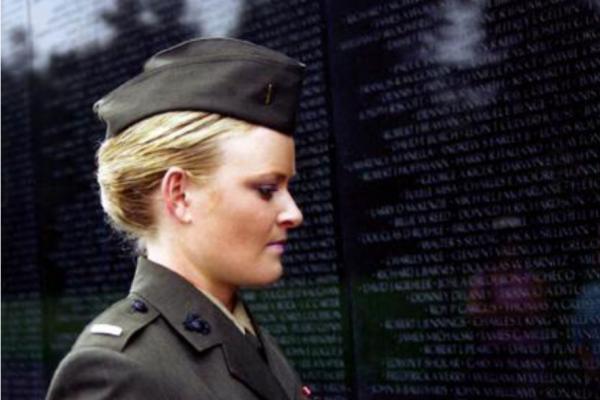Men and women in the military face numerous challenges when they return from combat—whether post-traumatic stress disorder, economic struggles, traumatic brain injury. A glimpse at the headlines tells us the grim statistics of active-duty suicides tied to these issues.
But a new film, The Invisible War, brings to light another staggering reality: a female soldier in a combat zone is more likely to be raped by another soldier than killed in enemy fire.
The Invisible War, which opens in some markets on June 22, takes on the military culture that has failed to address the problem.
Filmmakers Kirby Dick and Amy Ziering collected stories from sexual assault survivors across the country and show how hauntingly similar their the accounts are—from harassment to assault to lack of follow-up, and for some, blatant cover up. The powerful documentary pairs the survivors’ heartbreaking stories with alarming statistics illustrating the scope of the epidemic.
According to the Department of Defense, service members reported nearly 3,200 incidents of sexual assault in 2011. Of those closed out before 2012, fewer than 200 perpetrators were convicted and fewer than 150 confined. Other punishments handed out were reduction in rank, fines, discharge from service, and hard labor.
The Defense Department itself estimates that those 3,200 reports account for only about 14 percent of the sexual assaults that are actually taking place.
Sexual assault is notoriously underreported in the general public, but why is it so much worse in the military? According to the film, 33 percent of servicewomen didn’t report their rape because the person to report to was a friend of the rapist. And 25 percent didn’t report it because the person to report to was the rapist.
The women profiled in the film tell their stories of mishandled evidence, sweeping cases under the rug, and intimidation by those in authority.
“There’s no way out of it. If you think about it, the only way out of it is like, suicide or AWOL,” a survivor who served in the Army Criminal Investigation Division says in the film. “Those are your only two options. Suicide, AWOL—or deal with it.”
Until this past April—when Secretary of Defense Leon Panetta watched the documentary and promptly changed policy—a service member’s commanding officer was tasked with determining whether to prosecute in cases of sexual assault. In effect, this policy gave complete control of justice to one person—who may or may not be an impartial authority.
Panetta changed that policy and created a Special Victims Unit for each branch of the military.
But Dick and Ziering say they want more changes put in place.
They’re calling on the Defense Department to create a policy that would ensure that everyone convicted of a sex crime while in the military is listed on the National Sex Offender Public Registry. They want the military to stop diagnosing sexual assault survivors with personality disorders and discharging them from service before they’ve reached benefit eligibility—as illustrated by one of the women’s stories in the film.
The survivors in the film are representative of an overwhelming mass of voices that haven’t been heard until now. And it’s refreshing, in a way, to see their work empower other survivors. The film’s Facebook page and Twitter account have been highlighting other women and men who have come forward in support since seeing the film—perhaps the beginnings of an avalanche of voices demanding justice.
It’s impossible to watch The Invisible War and not be outraged.
But knowledge is the first step to change.
Editor's note: This article was updated on Aug. 24, 2022 to remove the name of a survivor quoted in the film.
Sandi Villarreal was associate web editor for Sojourners when this article was published.
Got something to say about what you're reading? We value your feedback!
